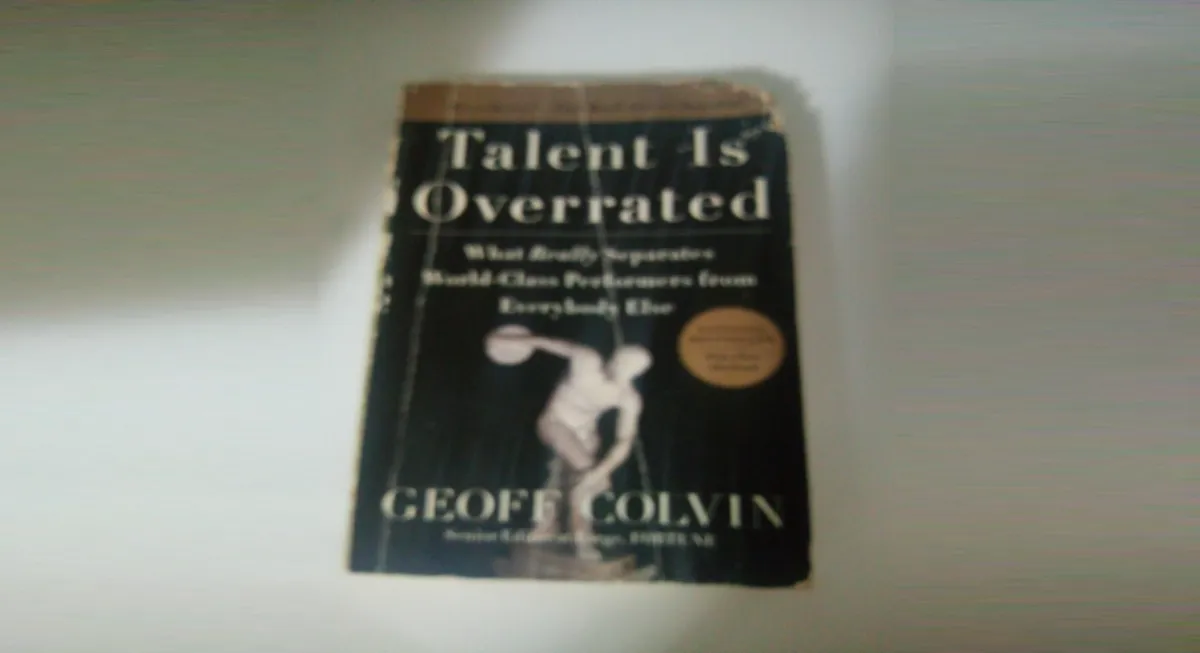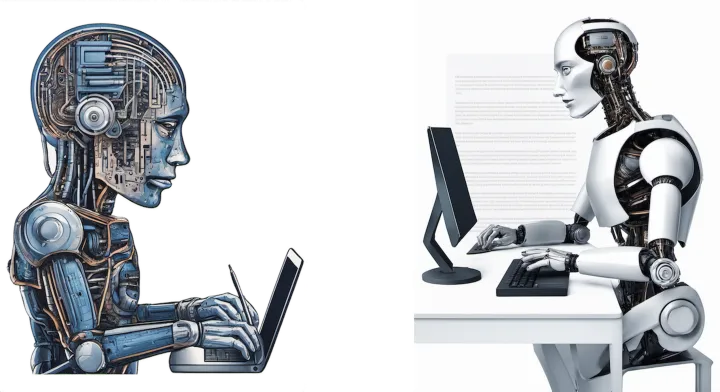Super Book Review: Talent Is Overrated by Geoff Colvin
"Great performance is in our hands far more than most of us ever suspected."

Written by An AI and a Human
Originally Published 01/24/2023
Talent Is Overrated: What Really Separates World-Class Performers from Everybody Else
Talent is Overrated: What Really Separates World-Class Performers from Everybody Else
"In "Talent Is Overrated: What Really Separates World-Class Performers from Everybody Else", journalist Geoff Colvin puts forth a new hypothesis about the factors that allow for extraordinary performance. Drawing on scientific research, Colvin argues that hard work and natural talent are not enough to make great performers - rather, it is a "deliberate practice" that sets world-class performers apart. Through stories of famous figures such as Benjamin Franklin, Jerry Rice, and Jeff Immelt, Colvin demonstrates how this type of effort can propel talented individuals to greatness. This book offers readers insight into the idea of deliberate practice and provides an interesting perspective on achieving excellence in any field."

Together, this Super Review was written for YOU, the superconsumer!
Author:
Geoff Colvin
About the Author
Geoff Colvin, is Fortune's senior editor-at-large and has written hundred of articles for the magazine including its popular column Value Driven. He lectures widely and is the regular lead moderator for the Fortune Global Forum. Colvin graduated Harvard cum laude with a B.A. in economics, and received his M.B.A. from New York University's Stern School. This is his first book, Talent Is Overrated, and it has earned global acclaim and was a Wall Street Journal, BusinessWeek, and New York Times business bestseller.
www.GeoffColvin.com
Summary:
"Geoff Colvin has written an insightful study of great achievers from Mozart to Tiger Woods, emphasizing that hard work is key to success."
-AI
"I agree with this sentiment, and Talent Is Overrated is not only insightful but also enlightening. Talent Is Overrated is a profoundly important book if you want to know why most people fail. With clarity and precision, Colvin exposes one of the fundamental misconceptions of modern life—that our ability to excel depends on innate qualities. He then draws on an array of compelling stories and stacks of research to reveal the true path to high performance: consistent, deliberate practice fueled by intrinsic motivation."
-SHiNER The Human
Daniel H. Pink, author of A Whole New Mind, said this is "the rare business book that will both prompt you to think and inspire you to act."
Pros:
The book is pro because:
- It provides comprehensive coverage of how to be GREAT.
- It is written in an easy-to-understand language.
- It includes examples and illustrations to help readers better understand why they are unable to succeed at life.
- It is available in both print and digital formats, making it accessible to a wide range of readers.
- It is a business book that will prompt you to think and inspire you to act.
Cons:
The book has no drawbacks. Unless you don't like reading about super-stars, mega-performers, and business moguls. Read it and learn.
Final Verdict:
Rewritten by an AI from the first chapter of the book.
Scroll to the end for our recommendation.
The mystery of great performance is more valuable than ever—but where does it really come from? It is mid-1978, and we are inside the giant Procter & Gamble headquarters in Cincinnati, looking into a cubicle shared by two twenty-two-year-old men, fresh out of college. Their assignment is to help sell Duncan Hines brownie mix, but they spend a lot of their time just rewriting memos according to strict company rules.
These two young men are of interest to us now for one reason: they are Jeffrey Immelt and Steven Ballmer, who before age fifty would become CEOs of the world's two most valuable corporations, General Electric and Microsoft. Contrary to what any reasonable person would have expected when they were new recruits, they reached the absolute apex of corporate achievement. The obvious question is how.
Was it talent? If so, it was a strange kind of talent that hadn't revealed itself in the first twenty-two years of their lives. Was it brains? These two were sharp but had shown no evidence of being sharper than thousands of their classmates or colleagues. Was it mountains of hard work? Certainly not up to that point.
And yet something carried them to the heights of the business world. Which leads to perhaps the most puzzling question: if that certain something turns out not to be any of the things we usually think of, then what is it?
Look around you. Look at your friends, your relatives, your coworkers, the people you meet when you shop or go to a party. How do they spend their days? Most of them work. They all do many other things as well, playing sports, performing music, pursuing hobbies, doing public service. Now ask yourself honestly: how well do they do what they do?
The most likely answer is that they do it fine. They do it well enough to keep doing it. At work they don't get fired and probably get promoted a number of times. They play sports or pursue their other interests well enough to enjoy them. But the odds are that few, if any, of the people around you are truly great at what they do—awesomely, amazingly, world-class excellent.
Why—exactly why—aren't they? Why don't they manage businesses like Jack Welch or Andy Grove did, or play golf like Tiger Woods did, or play the violin like Jascha Heifetz did? After all, most of them are good, conscientious people, and they probably work diligently. Some of them have been at it for a very long time—twenty, thirty, forty years. Why isn't that enough to make them great performers? It clearly isn't. The hard truth is that virtually none of them has achieved greatness or come even close, and only a tiny few ever will.
This is a mystery so commonplace that we scarcely notice it, yet it's critically important to the success or failure of our organizations, the causes we believe in, and our own lives. In some cases, we can give plausible explanations, saying that we're less than terrific at hobbies and games because we don't take them all that seriously. But what about our work? We prepare for it through years of education and devote most of our waking hours to it. Most of us would be embarrassed to add up the total hours we've spent on our jobs and then compare that number with the hours we've given to other priorities that we claim are more important, like our families; the figures would show that work is our real priority. Yet after all those hours and all those years, most people are just okay at what they do.
In fact, the reality is more puzzling than that. Extensive research in a wide range of fields shows that many people not only fail to become outstandingly good at what they do, no matter how many years they spend doing it, they frequently don't even get any better than they were when they started. Auditors with years of experience were no better at detecting corporate fraud—a fairly important skill for an auditor—than were freshly trained rookies. When it comes to judging personality disorders, which is one of the things we count on clinical psychologists to do, length of clinical experience told nothing about skill—“the correlations,” concluded some of the leading researchers, “are roughly zero.” Surgeons were no better at predicting hospital stays after surgery than residents were. In field after field, when it came to centrally important skills—stockbrokers recommending stocks, parole officers predicting recidivism, college admissions officials judging applicants—people with lots of experience were no better at their jobs than those with very little experience.
The most recent studies of business managers confirm these results. Researchers from the INSEAD business school in France and the U.S. Naval Postgraduate School call the phenomenon “the experience trap.” Their key finding: while companies typically value experienced managers, rigorous study shows that, on average, “managers with experience did not produce high-caliber outcomes.”
Bizarre as this seems, in at least a few fields it gets one degree odder. Occasionally, people actually get worse with experience. More experienced doctors reliably score lower on tests of medical knowledge than do less experienced doctors; general physicians also become less skilled over time at diagnosing heart sounds and X-rays. Auditors become less skilled at certain types of evaluations.
What is especially troubling about these findings is the way they deepen, rather than solve, the mystery of great performance.
When asked to explain why a few people are so excellent at what they do, most of us have two answers, and the first one is hard work. People get extremely good at something because they work hard at it. We tell our kids that if they just work hard, they'll be fine. It turns out that this is exactly right. They'll be fine, just like all those other people who work at something for most of their lives and get along perfectly acceptably but never become particularly good at it. The research confirms that merely putting in the years isn't much help to someone who wants to be a great performer.
So our instinctive first answer to the question of exceptional performance does not hold up. Our second answer is the opposite of the first, but that doesn't stop us from believing it fervently. It goes back at least twenty-six hundred years, to the time of Homer: “Call in the inspired bard Demodocus. God has given the man the gift of song.” We've changed our views on a lot of important matters since then—how the planets move, where diseases come from—but we have not changed our views on what makes some people extraordinarily good at what they do. We still think what Homer thought: that the awesomely great, apparently superhuman performers around us came into this world with a gift for doing exactly what they ended up doing—in the case of Demodocus, composing and singing. We use the same words that the ancient Greeks used, simply translated. We still say, as Homer did, that great performers are inspired, meaning that their greatness was breathed into them by gods or muses. We still say they have a gift, which is to say their greatness was given to them, for reasons no one can explain, by someone or something apart from themselves.
We believe further that such people had the great good fortune to discover their gift, usually early in life. While this explanation of great performance obviously contradicts the just-work-hard explanation, it's much more deeply rooted and in some ways is more satisfying. It explains why great performers seem to do effortlessly certain things that most of us can't imagine doing at all, whether it's forming a strategy for a multibillion-dollar company or playing the Tchaikovsky Violin Concerto or hitting a golf ball 330 yards. The natural-gift explanation also explains why extraordinary performers are so rare; god-given talents are presumably not handed out willy-nilly.
This explanation has the additional advantage of helping most of us come to somewhat melancholy terms with our own performance. A god-given gift is a one-in-a-million thing. You have it or you don't. If you don't—and of course most of us don't—then it follows that you should just forget now about ever coming close to greatness.
Thus, it's clear why most of us don't dwell on the mystery of great performance. We don't think it's a mystery. We've got a couple of explanations in our head, and if it ever occurs to us that the first one is clearly wrong, well, the second one is what we really believe anyway. And the nicest thing about the second explanation is that it takes the matter of great performance out of our hands. If we were really a natural at anything, we'd know it by now. Since we're not, we can worry about other things.
The trouble with this explanation—except it isn't trouble, it's excellent news—is that it's wrong. Great performance is in our hands far more than most of us ever suspected. New findings on this matter are now available.
Recommendation:
Buy this book and learn.






Comments ()